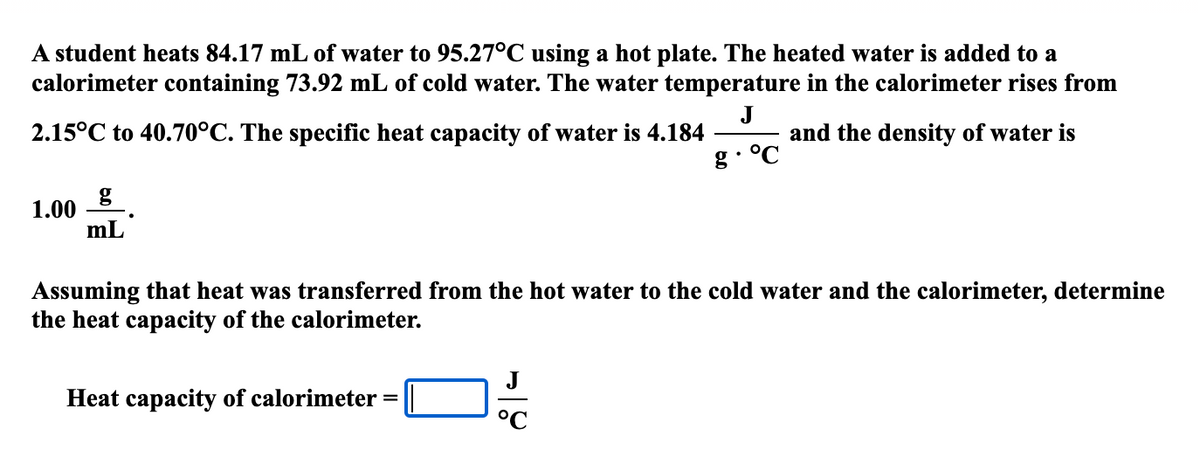A student heats 84.17 mL of water to 95.27°C using a hot plate. The heated water is added to a calorimeter containing 73.92 mL of cold water. The water temperature in the calorimeter rises from J 2.15°C to 40.70°C. The specific heat capacity of water is 4.184 and the density of water is g. °℃ 1.00 g mL Assuming that heat was transferred from the hot water to the cold water and the calorimeter, determine the heat capacity of the calorimeter. Heat capacity of calorimeter = J °C
A student heats 84.17 mL of water to 95.27°C using a hot plate. The heated water is added to a calorimeter containing 73.92 mL of cold water. The water temperature in the calorimeter rises from J 2.15°C to 40.70°C. The specific heat capacity of water is 4.184 and the density of water is g. °℃ 1.00 g mL Assuming that heat was transferred from the hot water to the cold water and the calorimeter, determine the heat capacity of the calorimeter. Heat capacity of calorimeter = J °C
Principles of Modern Chemistry
8th Edition
ISBN:9781305079113
Author:David W. Oxtoby, H. Pat Gillis, Laurie J. Butler
Publisher:David W. Oxtoby, H. Pat Gillis, Laurie J. Butler
Chapter12: Thermodynamic Processes And Thermochemistry
Section: Chapter Questions
Problem 14P
Related questions
Question

Transcribed Image Text:A student heats 84.17 mL of water to 95.27°C using a hot plate. The heated water is added to a
calorimeter containing 73.92 mL of cold water. The water temperature in the calorimeter rises from
J
2.15°C to 40.70°C. The specific heat capacity of water is 4.184
and the density of water is
g. °℃
1.00
mL
Assuming that heat was transferred from the hot water to the cold water and the calorimeter, determine
the heat capacity of the calorimeter.
Heat capacity of calorimeter
=
Expert Solution
This question has been solved!
Explore an expertly crafted, step-by-step solution for a thorough understanding of key concepts.
Step by step
Solved in 2 steps

Knowledge Booster
Learn more about
Need a deep-dive on the concept behind this application? Look no further. Learn more about this topic, chemistry and related others by exploring similar questions and additional content below.Recommended textbooks for you

Principles of Modern Chemistry
Chemistry
ISBN:
9781305079113
Author:
David W. Oxtoby, H. Pat Gillis, Laurie J. Butler
Publisher:
Cengage Learning

Chemistry: An Atoms First Approach
Chemistry
ISBN:
9781305079243
Author:
Steven S. Zumdahl, Susan A. Zumdahl
Publisher:
Cengage Learning

Chemistry: The Molecular Science
Chemistry
ISBN:
9781285199047
Author:
John W. Moore, Conrad L. Stanitski
Publisher:
Cengage Learning

Principles of Modern Chemistry
Chemistry
ISBN:
9781305079113
Author:
David W. Oxtoby, H. Pat Gillis, Laurie J. Butler
Publisher:
Cengage Learning

Chemistry: An Atoms First Approach
Chemistry
ISBN:
9781305079243
Author:
Steven S. Zumdahl, Susan A. Zumdahl
Publisher:
Cengage Learning

Chemistry: The Molecular Science
Chemistry
ISBN:
9781285199047
Author:
John W. Moore, Conrad L. Stanitski
Publisher:
Cengage Learning

Chemistry by OpenStax (2015-05-04)
Chemistry
ISBN:
9781938168390
Author:
Klaus Theopold, Richard H Langley, Paul Flowers, William R. Robinson, Mark Blaser
Publisher:
OpenStax

Chemistry for Engineering Students
Chemistry
ISBN:
9781337398909
Author:
Lawrence S. Brown, Tom Holme
Publisher:
Cengage Learning

Chemistry & Chemical Reactivity
Chemistry
ISBN:
9781133949640
Author:
John C. Kotz, Paul M. Treichel, John Townsend, David Treichel
Publisher:
Cengage Learning